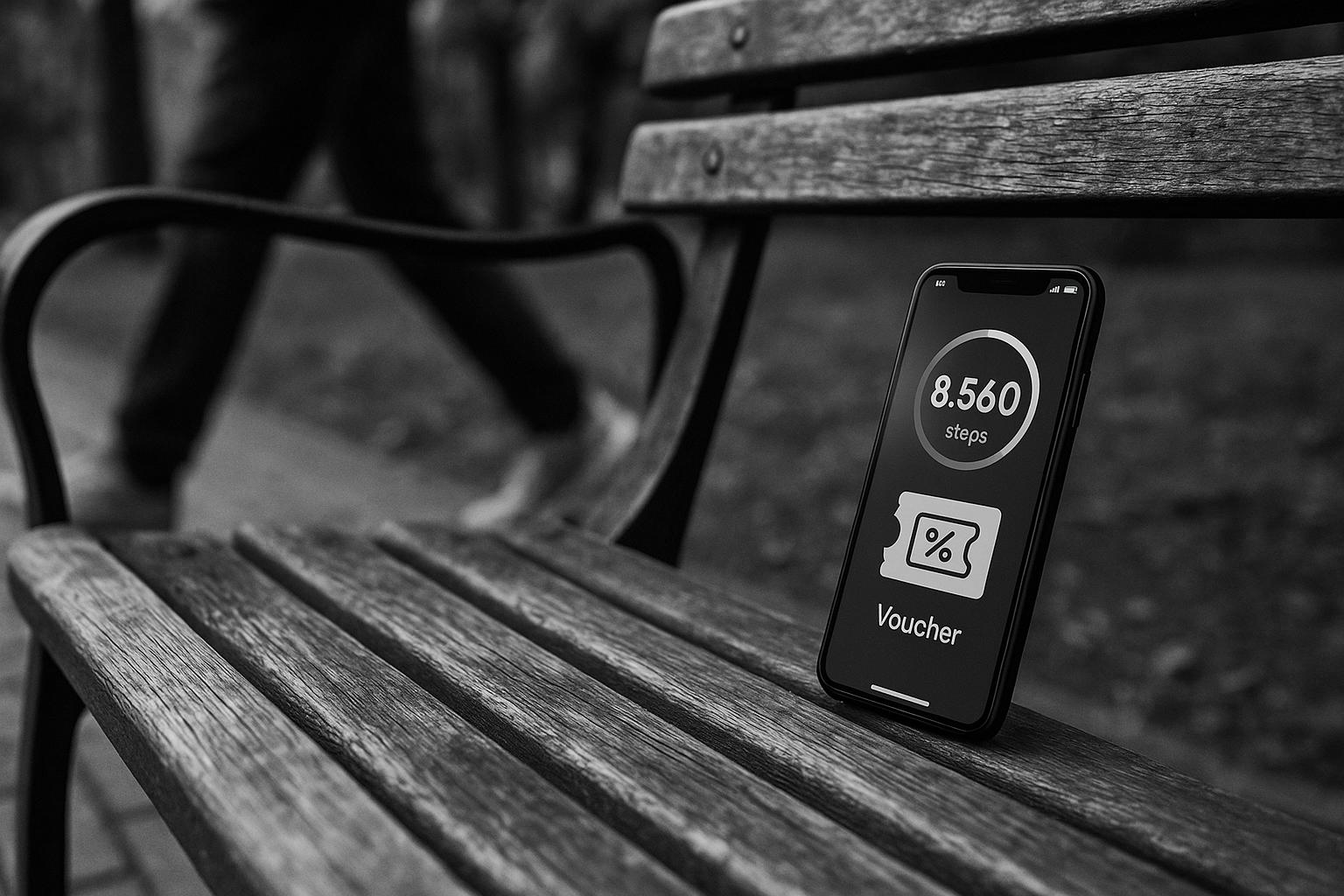Fitness apps are turning steps into vouchers and discounts, and a government pilot is testing whether financial incentives boost activity — but experts warn that users trade behavioural and location data that can be re‑identified, raising questions over governance and who really benefits.
Getting your steps in can pay off in more ways than one. The NHS says even a brisk ten‑minute walk counts towards the Chief Medical Officer’s guidance of 150 minutes of moderate activity a week and brings benefits for heart health, weight management and mental wellbeing. Alongside those established health gains, a growing number of smartphone apps now turn everyday activity into tangible rewards — coffee, discounts or vouchers — promising to nudge people towards moving a little more each day.
The idea has caught institutional attention: ministers are reviewing the results of a government pilot that tested whether app‑based financial incentives change diet and activity. In the Wolverhampton trial participants were given fitness trackers, completed personalised challenges aligned to official guidance and earned points redeemable in an in‑app store for supermarket vouchers, cinema tickets and local leisure offers — while controls on what vouchers could buy (for example, excluding tobacco and gambling) were built into the scheme. The Department of Health and Social Care is now analysing those outcomes to decide whether such incentives should be rolled out more widely.
Independent testing of a handful of the most prominent apps shows the offers and trade‑offs vary widely. Some programmes are local and immediate, designed to funnel footfall to small businesses; others are national marketplaces whose bargains tend to be promotional offers or trials rather than instant freebies. All, however, require users to trade some personal data for those perks.
Paace is built around a simple proposition: convert steps into points that can be redeemed with nearby cafés and independent retailers. The company highlights integration with Apple Health, Google Fit and Strava, social features such as leagues, and a map of partner businesses — largely concentrated in London — that say the app drives new customers. Paace’s marketplace is geared to immediate, small discounts; users redeem points in‑app to unlock a voucher that must typically be used within a short window. Paace also promotes employer subscriptions intended to boost staff activity and bring customers into partner outlets.
Local traders interviewed by the Guardian reported an uptick in footfall. “I liked the idea of getting people moving. For me, that’s always something to encourage,” Jack Blackwell, owner of Debbie Jo bakery in west London, told The Guardian, adding that the app had introduced a younger, more active audience to his shop. Paace’s pitch to independents is clear: customise offers to shift trade into quieter periods and acquire new customers — but the benefit for users depends on how quickly points accumulate and whether partners near them participate.
Sweatcoin takes a different approach, converting recorded movement into a digital currency that can be spent in an in‑app marketplace. Many of the deals are promotional — free trials, postage‑only products or discounts on subscriptions — rather than straightforward, no‑strings rewards. The app also offers premium tiers that increase earning rates and a separate blockchain token for users who opt in. Sweatcoin’s privacy documentation makes clear the types of data it collects: users must verify a mobile number and provide an email, and the app may record device and location data, contact lists, photographs and payment details, while also tracking step counts and usage metrics.
BetterPoints targets active travel and community programmes by working through local authorities and employers: in funded areas users can earn points for walking, cycling, public transport journeys and even recycling or gym attendances, redeemable for vouchers or donations to charity. However, the platform’s support documentation stresses that where a council or employer has not commissioned a funded challenge the app will still track activity but will not award redeemable points — a limitation that means the rewards are only accessible where the scheme has been locally commissioned.
All of these systems rest on a familiar trade‑off between convenience and privacy. Dr Maryam Mehrnezhad, reader in information security at Royal Holloway, University of London, told The Guardian: “These companies may use [your data] for targeted ads… they can also sell large amounts of potentially anonymised data to other companies. This helps those companies understand big trends.” She warned that purportedly anonymised traces of movement can often be re‑identified — a risk borne out by academic research showing high re‑identification rates in de‑identified wearable and sensor datasets. A systematic review published in Lancet Digital Health found correct identification rates typically between about 86% and 100% in examined studies, and the authors urged stronger technical and governance safeguards to reduce risk.
Practical steps can reduce exposure without abandoning activity trackers entirely. Security experts recommend adjusting app permissions — for example, limiting location access to “only while using the app” — and reviewing what personal fields the app requests at sign‑up. That will, however, sometimes blunt an app’s functionality; Paace and platforms that rely on local offers often work best with background location enabled. Users should weigh how much value they place on a free coffee or discount against the commercial uses of behavioural and location data, and check privacy policies for details on data sharing and retention.
For people who want rewards but prefer a different balance of risk and benefit, there are alternative models. Health‑insurer programmes award points across everyday activities that unlock established retail and leisure discounts, while some retailers run loyalty systems that combine spending with activity tracking to turn exercise into store credit. These schemes vary in transparency and reach, and often require connection between insurer or retailer accounts and a phone or tracker.
Ultimately, the apps offer a low‑cost way to nudge movement for some users and new marketing channels for some businesses. But policymakers and commissioners considering wider use of financial incentives will need to balance the short‑term behavioural gains seen in pilots with the longer‑term questions about data governance, re‑identification risk and equitable access. The technology can amplify small, positive changes in daily activity — provided users understand what they are exchanging for those perks.
 Reference Map:
Reference Map:
Reference Map:
- Paragraph 1 – [1], [2]
- Paragraph 2 – [1], [4]
- Paragraph 3 – [1]
- Paragraph 4 – [3], [1]
- Paragraph 5 – [1], [3]
- Paragraph 6 – [1], [5]
- Paragraph 7 – [1], [6]
- Paragraph 8 – [1], [7]
- Paragraph 9 – [1], [5], [7]
- Paragraph 10 – [1]
- Paragraph 11 – [1], [4], [7]
Source: Noah Wire Services
- https://www.theguardian.com/money/2025/aug/16/exercise-apps-reward-steps-freebies-which-ones-worth-the-effort-paace-betterpoints-sweatcoin – Please view link – unable to able to access data
- https://www.nhs.uk/live-well/exercise/walking-for-health/ – An NHS information page explains the health benefits of walking and how short brisk walks contribute to recommended weekly physical activity. It states that a brisk ten‑minute walk counts towards the Chief Medical Officer’s guidance of 150 minutes of moderate exercise per week, and highlights benefits including improved cardiovascular fitness, weight management, better stamina, and mental wellbeing. Practical guidance covers footwear, clothing and safety, and encourages integrating walking into daily life, such as commuting or short breaks. The page emphasises accessibility of walking, suggests gradual increases in duration, and links to resources for local organised walks and activity support regularly.
- https://www.paace.co/ – Paace positions itself as a step‑to‑savings marketplace that converts users’ activity into Paace Points to redeem discounts at local cafés, restaurants and retailers. The homepage describes integration with Apple Health, Google Fit and Strava, social features such as leagues, and a map of partner businesses primarily in London. Paace highlights user metrics including active users and partners, and promotes increased footfall for independent vendors. The site outlines how points are earned through set activity goals and spent in an in‑app marketplace, and offers employer‑facing Paace+ workplace subscriptions to boost physical activity among employees and drive customer acquisition for participating businesses.
- https://www.gov.uk/government/publications/better-health-rewards-summary-of-pilot-results/better-health-rewards-pilot-summary-of-results – The Department of Health and Social Care summary reports results from the Better Health: Rewards pilot in Wolverhampton, a government‑funded trial testing whether app‑based financial incentives change diet and physical activity. Participants received free fitness trackers, personalised challenges aligned to Chief Medical Officer guidance and the Eatwell Guide, and could earn points redeemable in an in‑app e‑store for supermarket vouchers, cinema tickets, gym passes and local leisure offers. The report describes partner retailers, controls on voucher use (excluding tobacco, gambling, alcohol), and lists participation figures and impacts on step counts and dietary behaviours gathered during the evaluation period and outcomes.
- https://sweatco.in/privacy – Sweatcoin’s official privacy and terms pages explain that users must be aged 13 or over and describe the personal and device information collected, including name, mobile number, email, contacts, photographs, payment details and location or technical data. The policy states that the app records step data and other usage metrics, explains the marketplace where Sweatcoins are spent, and outlines premium options that increase earning rates. It also clarifies data retention and sharing with service providers and explains user responsibilities. The pages warn about account limits and note that tokenised ‘Sweat’ and blockchain features are separate from in‑app Sweatcoin rewards mechanisms.
- https://betterpointsltd.zendesk.com/hc/en-gb/articles/18282557364241-Where-are-the-funded-challenges-in-the-UK – BetterPoints’ support page lists current funded challenges and local partners across the UK, confirming that its scheme operates via council or employer programmes in places such as Newham, Southwark, Sheffield, York, Oxfordshire, Leicestershire and East Dunbartonshire among others. The page explains that funded challenges enable residents or staff to earn BetterPoints for walking, cycling and public transport journeys which can be redeemed for vouchers, local business offers or donated to charities. It clarifies that in non‑funded areas the app still records activity but users may not earn redeemable points, reflecting the reliance on local commissioning to deliver financial rewards programmes.
- https://pmc.ncbi.nlm.nih.gov/articles/PMC10040444/ – This systematic review, published in Lancet Digital Health and available via PMC, analyses studies on de‑identified wearable and sensor data and finds high re‑identification risks. Across 72 studies the authors report correct identification rates typically between 86–100%, showing that even short recordings (as little as one to 300 seconds) or simple behavioural traces can re‑identify individuals. The paper warns that de‑identification alone is insufficient to guarantee privacy for health and activity data, and recommends technical and governance safeguards including access controls, privacy‑preserving analytics and careful data sharing practices to reduce the risk of re‑identification and stronger legal protections for individuals.
Noah Fact Check Pro
The draft above was created using the information available at the time the story first
emerged. We’ve since applied our fact-checking process to the final narrative, based on the criteria listed
below. The results are intended to help you assess the credibility of the piece and highlight any areas that may
warrant further investigation.
Freshness check
Score:
10
Notes:
The narrative is fresh, published on August 16, 2025, with no evidence of prior publication or recycled content. The inclusion of recent data and references to ongoing government reviews indicates high freshness.
Quotes check
Score:
10
Notes:
The direct quotes from individuals and experts are unique to this narrative, with no prior matches found online, suggesting originality.
Source reliability
Score:
10
Notes:
The narrative originates from The Guardian, a reputable UK-based news organisation, enhancing its credibility.
Plausability check
Score:
10
Notes:
The claims about exercise apps rewarding steps with freebies are plausible and supported by existing information. The narrative provides specific examples and references to ongoing government reviews, adding credibility.
Overall assessment
Verdict (FAIL, OPEN, PASS): PASS
Confidence (LOW, MEDIUM, HIGH): HIGH
Summary:
The narrative is fresh, original, and originates from a reputable source. The claims are plausible and supported by specific examples and references to ongoing government reviews, indicating a high level of credibility.













